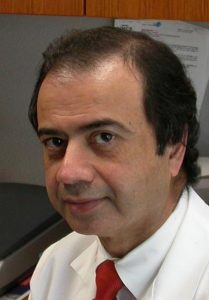Foundation-Funded Lab at MD Anderson Advances Discoveries in Peritoneal Carcinomatosis

“We are really grateful for the support from the foundation. It has been tremendous for us.” – Jaffer A. Ajani, M.D.
About 45% of gastric cancer patients experience peritoneal carcinomatosis (PC), the spread of the cancer to the abdominal lining—a development that’s associated with poor outcomes. Last year, the Gastric Cancer Foundation awarded a $75,000 research grant to Jaffer A. Ajani, MD, Professor of Gastrointestinal Medical Oncology at The University of Texas MD Anderson Cancer Center. The funding fueled new discoveries in Ajani’s lab that he hopes will aid the development of therapies for PC.
In a study published in April in the journal Gut, Ajani’s lab reported that a gene called YAP1 is upregulated in PC tumor cells and appears to drive metastasis. And if other cancer-driving genes are inhibited with drugs, Yap1 takes over, allowing tumors to grow even as they are treated. “It’s like the ultimate method of resisting stress caused by treatment,” Ajani said.
Ajani and his colleagues are also studying emerging gene targets in gastric cancer, including GTX4. “We believe it’s not just a bystander—it’s a driver for gastric cancer cells. So we are planning more studies to understand this particular target,” said Ajani, who is working with four other labs to conduct the research.
The lab is also pursuing another potential target for treating gastric cancer, MTORC1, a gene that has been well characterized in other cancers but is now emerging as a potential driver of stomach tumors, Ajani said.
It’s not just individual genes that Ajani is focusing on, but also an effort to establish a “gene signature” for gastric cancer. With the help of funding from GCF, Ajani’s team sequenced tumors from 20 newly diagnosed gastric cancer patients. The researchers were surprised to discover that nearly one-third of the cancer cells were not gastric in origin. Instead they took on profiles more commonly seen in the colon or other parts of the GI tract.
“We went on to show that those cells are using different machineries than other cells, but we don’t know exactly how they do that,” Ajani said.
In addition to setting out to solve that mystery, Ajani’s lab is building a “gene signature” of gastric cancer that may allow oncologists to predict patients’ prognoses based on the genomic characteristics of their tumors.
That could aid not just in the treatment of gastric cancer, but more specifically the management of PC, he said. GCF’s support is key to making that happen.
“We hope to determine what kind of cancer cell profile is capable of going to the peritoneal cavity. Then we’ll study that in greater detail to see if it’s something we can inhibit,” Ajani said. “We are really grateful for the support from the foundation. It has been tremendous for us.”
